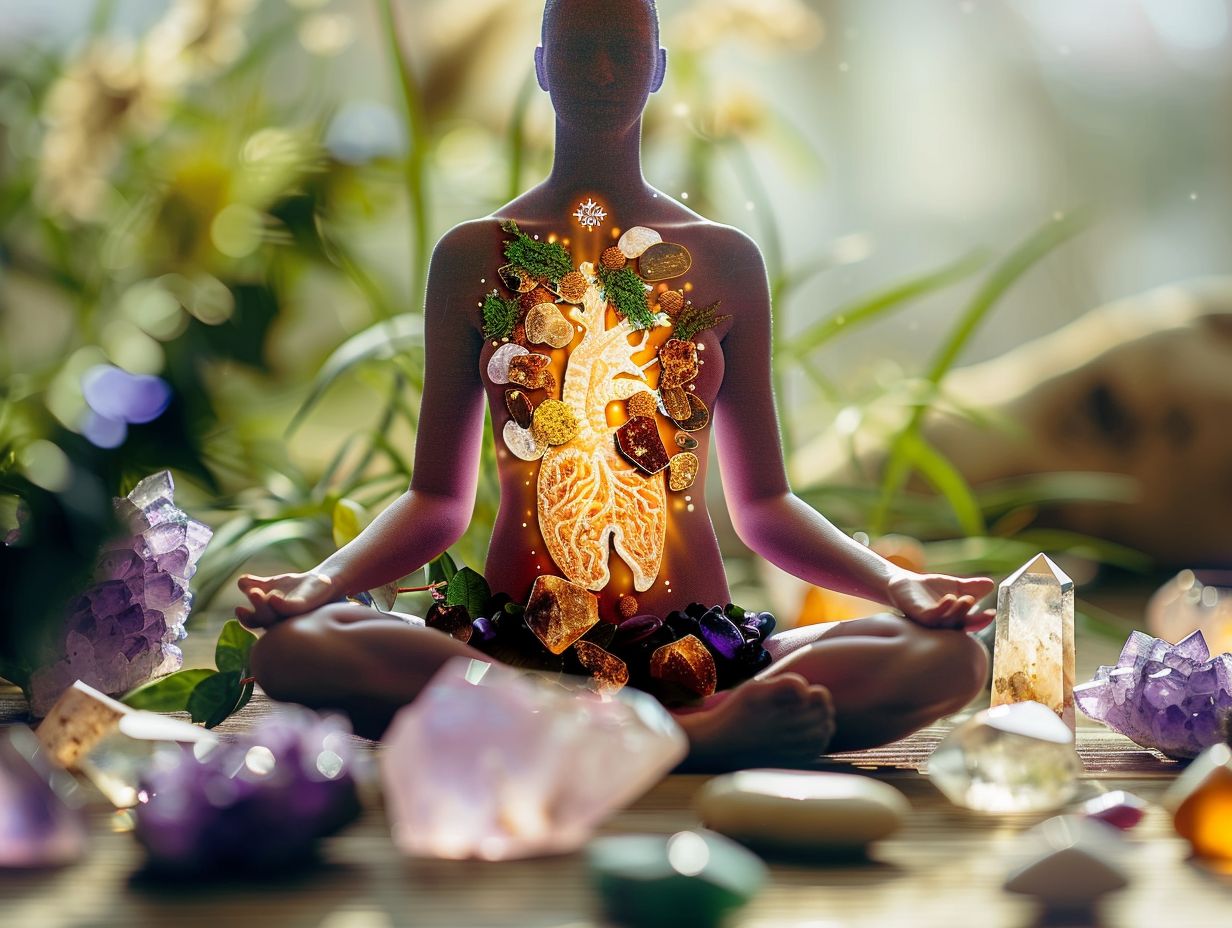
Holistic Approaches to Liver Health: Crystals and More
Holistic health encompasses a comprehensive approach to overall well-being, with the liver playing a crucial role in this framework. This article covers the functions of the liver, indicators of its health, factors leading to liver damage, and the advantages of holistic methods for liver health.
Additionally, the article explores the supportive role of crystals in liver health and suggests holistic practices for daily incorporation. Readers can expect guidance on maintaining liver health and leveraging crystals for optimal well-being, embarking on a journey towards holistic liver wellness.
What is Holistic Health?
Holistic health is an inclusive approach to well-being that considers the mind, body, and spirit, acknowledging the interconnected nature of these components in achieving optimal health and wellness.
This health philosophy prioritizes treating the individual as a whole rather than focusing solely on isolated symptoms or body parts. By highlighting the connection between the mind and body, holistic health encourages individuals to address not only physical ailments but also emotional and spiritual imbalances.
Key principles of holistic health include promoting self-care, encouraging individuals to actively participate in their well-being, and fostering balance and harmony in all areas of life. By incorporating holistic practices like yoga, meditation, acupuncture, and nutrition, individuals can develop a state of overall wellness that promotes long-term health and vitality.
What is the Liver and Why is it Important for Holistic Health?
The liver is an essential organ with a variety of functions that are critical for overall health and well-being in a holistic context. This vital organ is responsible for detoxification, filtering toxins from the bloodstream, and aiding in the digestion of fats.
Additionally, the liver plays a significant role in regulating energy balance by storing and releasing glucose as needed by the body. It is important to maintain liver health for optimal wellness, as the liver produces bile for digestion and stores essential vitamins and minerals.
Holistic practices like following a balanced diet, engaging in regular exercise, and ensuring adequate hydration can help support liver function and improve overall health.
What are the Functions of the Liver?
The liver carries out vital functions such as detoxification, metabolism, and nutrient storage to maintain overall health and vitality.
A significant responsibility of liver detoxification is to metabolize toxins and waste substances that enter the body from food, drinks, and environmental sources. Furthermore, the liver plays a critical role in managing energy equilibrium by converting nutrients into usable forms for energy generation or storage. Maintaining optimal liver function is essential for comprehensive well-being, as it aids in body detoxification, influences metabolism, and affects overall energy levels, which all contribute to a healthier and well-rounded lifestyle.
What are the Signs of a Healthy Liver?
Signs of a healthy liver can be observed through clear skin, balanced energy levels, and an overall sense of vitality that contributes to a feeling of well-being.
When the liver is functioning optimally, individuals may notice a radiant and blemish-free skin, indicating the organ’s efficient elimination of toxins. Maintaining sustained energy levels throughout the day is common when the liver is in good health, enabling individuals to approach tasks with vigor and alertness. The vitality associated with a healthy liver not only influences physical well-being but also enhances mood and mental clarity, fostering a harmonious balance within the body.
Monitoring these indicators of a healthy liver can assist in the maintenance of overall wellness and vitality.
What are the Causes of Liver Damage?
Liver damage can stem from various factors, such as poor dietary choices, excessive alcohol consumption, and exposure to toxins that disrupt overall health.
These factors not only affect the liver’s optimal functioning but also impact overall well-being. Unhealthy dietary patterns high in processed foods and saturated fats can result in fat accumulation in the liver, leading to non-alcoholic fatty liver disease. Prolonged alcohol abuse not only directly harms liver cells but also interferes with its detoxification processes. Environmental toxins like pesticides, heavy metals, and pollutants additionally stress the liver, impeding its ability to eliminate harmful substances from the body.
Embracing holistic approaches like maintaining a balanced diet, reducing alcohol consumption, and minimizing exposure to toxins can significantly enhance liver health and support overall wellness.
What Foods and Habits can Harm the Liver?
Certain dietary choices high in saturated fats and processed sugars, as well as habits like excessive alcohol consumption, can have negative effects on the liver and impede its detoxification processes crucial for overall wellness.
A diet that is liver-friendly plays a significant role in maintaining optimal liver function. Including foods that are rich in antioxidants, such as berries, leafy greens, and turmeric, can help decrease inflammation and enhance detoxification. Drinking an ample amount of water to stay hydrated assists in flushing out toxins from the liver. Regular physical activity also supports liver health by boosting circulation and promoting general well-being. Embracing these holistic approaches can not only be beneficial for the liver but also contribute to improved overall health and vitality.
What are the Benefits of Holistic Approaches to Liver Health?
Holistic approaches to liver health provide various benefits, such as natural detoxification, improved energy balance, and overall well-being through holistic healing practices. These methods emphasize treating the body as a whole, targeting the underlying cause of liver problems rather than just managing symptoms. By advocating for a balanced diet abundant in nutrients and antioxidants, holistic approaches assist in the liver’s natural detoxification processes. This not only facilitates liver detoxification but also enhances energy levels by optimizing its performance. Holistic healing techniques, like acupuncture and herbal remedies, work alongside traditional medicine to offer a comprehensive strategy for liver health.
How Can Crystals Help with Liver Health?
Crystals may play a role in supporting liver health by encouraging energetic balance, aiding in detoxification processes, and promoting emotional well-being through crystal therapy.
Through the utilization of specific crystals such as Citrine and Tiger’s Eye, one can access the healing properties that support liver health. These crystals contribute to the purification and cleansing of the liver, facilitating the elimination of toxins and enhancing overall liver function. Crystal therapy also addresses emotional imbalances that may affect liver health, aiding individuals in managing stress and anxiety that could impact liver conditions. By leveraging the energy-balancing advantages of crystals, individuals can comprehensively support their liver health.
What Other Holistic Methods can Support Liver Health?
Plus crystal therapy, holistic methods such as acupuncture, herbal remedies, and energy healing can also support liver health by promoting detoxification and restoring balance.
Acupuncture, a traditional Chinese therapy, works by stimulating specific acupoints to enhance the flow of energy throughout the body, including the liver meridian. By addressing blockages and imbalances in the liver’s energy flow, acupuncture can improve liver function and overall well-being.
Herbal remedies, on the other hand, offer natural liver support through potent plant compounds that aid in detoxifying the liver and reducing inflammation. Energy healing techniques, like Reiki, focus on restoring the body’s energy balance to support liver health and optimize its detoxification processes.
What are the Risks of Using Holistic Approaches for Liver Health?
While holistic approaches offer many benefits, there are risks involved, such as improper use of supplements, inadequate professional guidance, and potential interactions with conventional medications that may impact liver health negatively.
It is crucial for individuals considering holistic methods for liver health to seek guidance from healthcare providers or knowledgeable professionals. Understanding the potential risks and implications of using supplements is vital to prevent harmful effects on the liver. Being cautious about interactions between holistic remedies and mainstream medications is important to avoid adverse outcomes. Expert supervision can help assess individual needs and ensure that holistic practices are safe and suitable for promoting liver health without posing any risks.
How Can You Incorporate Holistic Approaches into Your Daily Routine?
Incorporating holistic practices into a daily routine can benefit liver health by focusing on self-care activities like meditation, yoga, and mindful eating that support overall well-being and energy balance.
These holistic approaches not only aid in improving liver function but also help in reducing stress levels, boosting immunity, and promoting a sense of inner peace. Integrating meditation into a daily routine can reduce inflammation in the body and enhance liver detoxification processes. Practicing yoga regularly can improve circulation, which is essential for liver health. Making conscious nutrition choices that include plenty of fruits, vegetables, whole grains, and lean proteins can further support optimal functioning of the liver.
What are Some Tips for Maintaining a Healthy Liver?
For maintaining a healthy liver, it is important to focus on a balanced diet that includes fruits, vegetables, and whole grains. Adequate hydration, limited alcohol consumption, and regular physical activity also play a key role in supporting overall wellness.
Incorporating foods such as leafy greens, berries, nuts, and lean proteins into meals can provide essential nutrients such as antioxidants and fiber that are beneficial for liver function. Hydration is essential for flushing out toxins and aiding digestion, so it is recommended to aim for at least 8-10 glasses of water daily. Limiting alcohol intake can help reduce strain on the liver.
Engaging in regular exercise is not only beneficial for weight management but also enhances overall well-being and liver health by improving metabolism and circulation.
How Can You Use Crystals for Liver Health?
Crystals can be used for liver health by integrating them into the environment, wearing crystal jewelry, or taking part in crystal healing sessions to experience the benefits of their supportive properties for overall liver support.
Placing crystals strategically in your living or work space can encourage a positive energy flow, which may contribute to liver health. Selecting specific crystals like citrine or tiger’s eye, known for their detoxification properties, can be beneficial in this regard.
Wearing crystal jewelry, such as a citrine pendant or a tiger’s eye bracelet, allows you to carry the healing energy with you throughout the day.
Engaging in crystal healing sessions with a qualified practitioner can enhance the advantages by directing the crystals’ energy directly into your body for comprehensive liver support.
What Other Holistic Practices can Benefit Liver Health?
Plus crystal therapy, other holistic practices like Reiki, acupuncture, and chakra balancing can be beneficial for liver health by harmonizing energy flow, promoting relaxation, and supporting holistic well-being.
Energy healing modalities such as Reiki work on the principle of channeling universal energy to restore balance within the body, including the liver. By clearing energy blockages and promoting deep relaxation, Reiki can support the liver’s natural detoxification processes.
Chakra balancing techniques help align the body’s energy centers, ensuring a smooth flow of vital energy throughout the system. This balance not only benefits the liver but also contributes to overall physical and emotional well-being.




No Comments